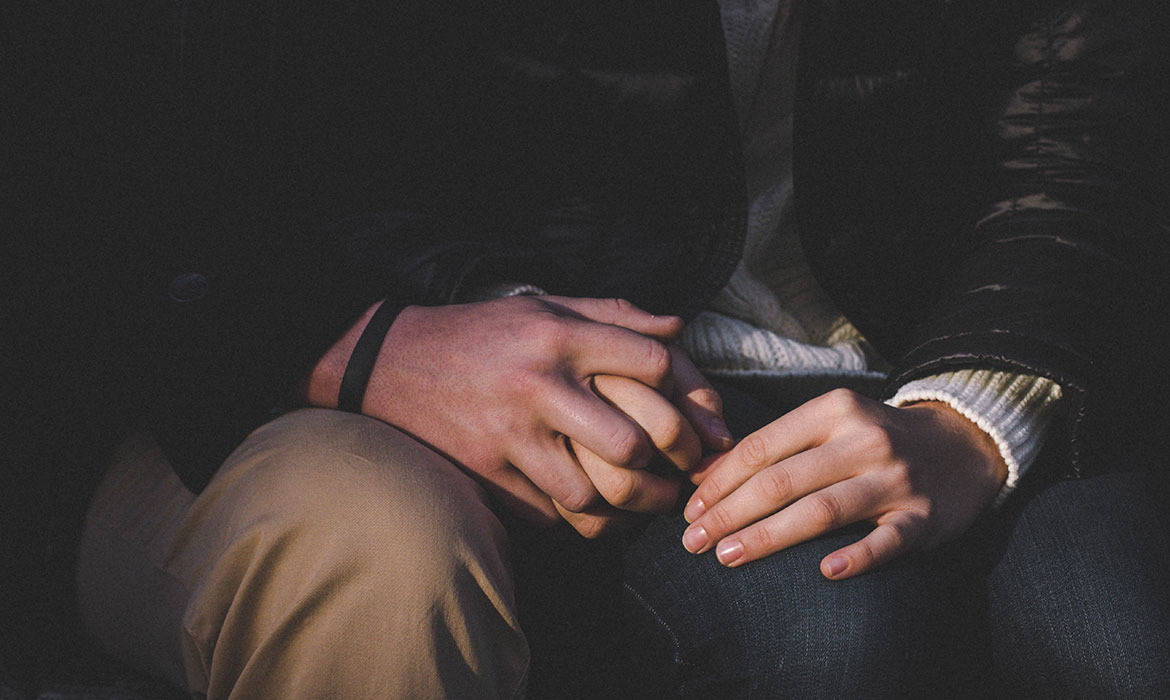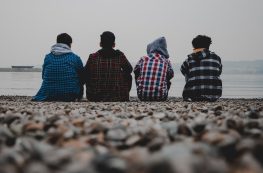Every week in the month of April we will be featuring an article on the art of friendship. To see the full series, click HERE.
by Sarah Van Diest, author of God in the Dark
He said it felt as if he were in a raft floating down a river and up ahead he could hear the crashing sounds of a massive waterfall. He had no paddles. There were no handy, low-hanging vines to grab. There was nothing he could use to stop his small craft from plummeting over the edge and crashing to the rocks below. The inevitable was coming, and he could do nothing to stop it.
As he drifted down the river, we, his friends, could only stand on shore and watch.
It’s a dread-filled feeling to be in that boat, and it’s a dread-filled feeling to watch someone you love be trapped like that. Helpless is the word this picture calls out.

So what did we do? Well, for one thing, we stayed at the river’s edge and didn’t leave, walking along the river in cadence with his boat. We called out to him letting him know he wasn’t alone. Even as the calamitous sounds of the river roared louder, we called out louder, sometimes waving wildly colored banners with bold words printed on them like “YOU ARE NOT ALONE!” We knew that sometimes he probably couldn’t hear us or see those flags, and we never demanded a reply. We just kept reminding him that we were there.
It helped that we had been over that waterfall ourselves and had survived. Because of that, we knew what supplies our friend would likely need once the terror of the fall was over. And we knew there would still be life and breath on the other side, something he could not yet fathom.
Putting this metaphor aside, and I hope it was clear this was indeed a metaphor, what does helping a friend through a dark and difficult time look like?
The guiding principle for me in times such as these is this: Let yourself be the fool.

And by this I mean to say, put your sense of conventional propriety aside and let love be unmistakably and unashamedly the dominating rationale for all you do. You may appear foolish in your overt demonstrations of love and care, but does that matter? Is it your goal in life to appear reasoned and proper? Or is your goal to love? Simple questions.
When you let love dominate, knowing you may appear foolish as a result, there is a very real sense of laying down your life for a friend. You are stripping yourself of your coverings and protections for the hope of benefiting another. There are no guarantees, but there is hope.
The means through which you choose to love your friend are not for me to determine. What are their needs? What do you have to give? For me, I could do two things: I could pray, and I could write. The praying happened whenever my friend came to mind, which of course, was often. I used those thoughts as triggers to lift up a prayer. The writing was the way in which I called out from the shore and reminded him that he was not alone. He didn’t ask any of this from me. I just did it.

There have been many friends for whom I have done this kind of thing. Depending on our relationship and their personality, the “calling out from the shore” takes on different forms—long emails or short text messages, letters or short Scripture passages. Sometimes I don’t write at all. I send a gift in the mail or propose a time for coffee or a walk. It depends.
At times, I’ve felt (when overly self-aware) that I was pushing myself onto people. After all, they didn’t ask for my emails or texts, or even my prayers. Who am I to intrude into their lives and “love on” them, as they say in the South? But then, once again, I step back and look at the big picture, the goal, which is love, and I allow myself to be the fool, if it should come to that.
Our sense of self-protection and self-preservation can misdirect us at times. Though these are not bad traits—they show our God-given worth and value, for we are worthy of protection—they can hinder us from engaging with those we hope to love. They can prevent us from entering the darkness with our friend.

I said this to a friend in an email one time: “We are comforted when we know someone knows us . . . and hasn’t run screaming into the night! Or if they do, they come back with blankets and hot cocoa, and they sit with us a while longer in the dark until we are ready to walk on.”
Doing this life alone is painfully difficult. This life is hard, but suffering through its chaos without supportive companionship is nigh torturous.
Our Father promises never to leave us, so even when there are no companions in sight, he is there.
We are called to lay down our lives, become the fool if need be, and love. Our lives are spent well and wisely when we let love reign. Indeed, the fool then becomes the wise.
 God in the Dark by Sarah Van Diest
God in the Dark by Sarah Van Diest
Life’s painful trials can bring shame about our inadequate and broken faith. There is relief in hearing the expressions of desperation in the psalmist’s voice. He didn’t experience this life perfected, and we don’t either. But the psalmist was loved. So are we.
God was so kind to give us the Psalms.
To walk through darkened days is part of the human experience. To walk through them with faith, comfort, strength, joy, and hope is part of the divine experience. Our eyes, though, are often clouded to those blessings by the thing oppressing us. When we remember and recognize our Father’s faithfulness, when we see reality with the eyes of understanding, the darkness ebbs and the light of hope grows. The impossible, unbearable, and unthinkable becomes the hidden passageway to truth, hope, and joy in Christ.
These letters were originally written as encouragement to a friend when the darkness began to overtake his path. Each day for 22 days, a letter arrived with one of the eight-verse sections from Psalm 119 along with a small thought to bring light and hope and to be a reminder that we do not fight our battles alone. The letters, along with nine more devotions on the subject of experiencing God in the dark, make up this powerful, honest, hope-filled 31-day devotional.





2 Comments
“Doing this life alone is painfully difficult. This life is hard, but suffering through its chaos without supportive companionship is nigh torturous.”- I loved this. Such a powerful words. Really, no man is an island. We all need someone. And sometimes, their presence is enough. And knowing that there is someone out there that you can call anytime, and help you anytime is such a blessing.
[…] How to Help a Friend Walking Through a Dark Time by Sarah VanDiest […]